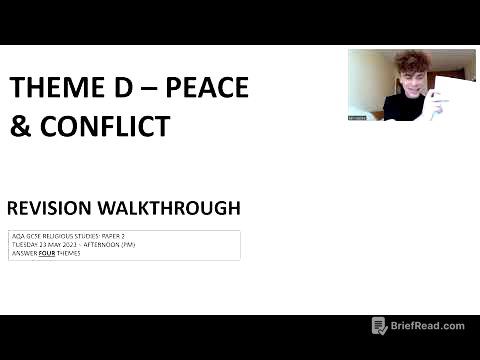TLDR;
This YouTube video features a workshop session by Jeremy Lumtobing, CEO of Extravaganza Group and CMO of Philosophy Group, focusing on effective communication and leadership. The session aims to empower the next generation of leaders by transforming nervousness into confidence. Key points include understanding the power of communication, reframing mindset, practicing with purpose, prioritizing presence over perfection, and recognizing communication as leadership in action.
- Communication shapes leadership and inspires others.
- Nervousness is natural and can be transformed into purposeful energy.
- Authenticity outweighs perfection in connecting with an audience.
Introduction and Welcome [9:45]
The session begins with a welcome and introduction to the topic of problem definition in product design. The host expresses excitement and nervousness about the event, emphasizing its relevance for students nearing their final semester and economic survival projects. The importance of confidently presenting ideas is highlighted as a crucial skill.
Speaker Introduction: Jeremy Lumtobing [18:43]
Jeremy Lumtobing introduces himself, sharing his background in law and his unexpected journey into the creative industry. He discusses his roles as CEO of Extravaganza Group and CMO of Philosophy Group, detailing the various companies under his leadership, including event organizers, wedding planners, and a creative agency. Jeremy emphasizes that he is not an expert but has learned effective communication through business experiences, which he will share to help turn nervousness into confidence and leadership.
Empowering Communication for Leaders [22:59]
Jeremy introduces the theme of empowering the next generation of leaders through effective communication, acknowledging that nervousness is a common experience. He stresses that communication is the foundation of leadership and that nervousness can be transformed into confidence and connection. The session will cover stories, insights, and lessons learned from experience on how to move from nervous to the next level.
Understanding Nervousness [26:39]
The discussion shifts to understanding nervousness, emphasizing that it indicates caring and awareness rather than weakness. Nervousness is described as the body's preparation to perform and pay attention. The goal is not to eliminate fear but to channel it into presence and focus. Confidence is defined as the mastery of fear, not the absence of it, and comes from learning to work with fear.
The Biology of Fear [29:00]
Jeremy explains the biological reasons behind nervousness, linking it to the brain's fight, flight, or freeze response. This response is triggered by the perception of a potential threat when speaking in front of an audience, similar to how ancestors perceived danger. Understanding this biology allows individuals to regain control and manage their fear by recognizing they are safe and prepared.
Reframing Your Mindset [31:00]
The first step to improving communication skills is reframing the mindset. Instead of focusing on the fear of failure, one should focus on the value they can deliver. This shift changes the focus from fear to purpose, making the energy calmer and more genuine. Purpose provides clarity, which in turn builds confidence.
Practicing with Purpose [33:08]
Effective practice involves rehearsing the message, not memorizing a script. Understanding key points and the flow of the story makes delivery sound natural and confident. Practicing out loud helps build familiarity with one's voice, and recording oneself allows for observation of tone, energy, and facial expressions. Preparation amplifies confidence, reducing the room for fear.
Presence Over Perfection [35:52]
Authenticity builds connection, while perfection creates distance. Being real, smiling, and continuing despite stumbles makes people listen. Focus on being present, listening to the audience, responding to their reactions, and breathing. Presence speaks louder than words, and people remember how you made them feel.
Leadership Through Communication [37:26]
Communication is leadership in action, influencing and connecting with people through words and actions. Great leaders inspire and fill the room with meaning. Empathy, clarity, and vision empower others, creating movement. Every conversation is a chance to lead, starting in the smallest moments.
Habits of Communicative Leaders [39:42]
Communicative leaders listen to understand, not just to respond, making people feel heard. They simplify complex ideas into actionable clarity, ensuring their team knows exactly what to do next. They inspire confidence through consistency and authenticity, building a culture through conversation rather than commands.
Moving from Nervous to the Next Level [42:12]
To move beyond nervousness, one must step outside their comfort zone, channeling nervous energy into enthusiasm. Celebrate small wins to compound confidence and focus on progress and impact rather than perfection. Each authentic and intentional communication evolves the speaker.
Reflective Moment and Audience Interaction [44:39]
Jeremy pauses to engage the audience, asking them to share their fears in communication and how they can transform them into strengths. He offers a reward for students who share their experiences, encouraging live participation and discussion.
Sharing Experiences: Abdan's Story [53:43]
Abdan shares his experience of being an MC in front of a large crowd and how he learned to improve by focusing on the message rather than memorizing words. Jeremy advises him to continue sharing his authentic self and to memorize the message, not the words.
Sharing Experiences: Roberto's Story [57:56]
Roberto discusses his fear of misunderstanding when speaking in public, particularly during a United Nations summit. He learned that his fear showed he cared and that communication is about being real. Jeremy advises him to deepen his empathy to better communicate with diverse teams.
Sharing Experiences: Satria's Story [1:04:06]
Satria agrees with the importance of being present rather than perfect in presentations. Jeremy emphasizes that authenticity comes from self-awareness and aligning words, intentions, and actions. He reiterates the importance of rehearsing the message and presenting oneself authentically.
Key Takeaways [1:08:23]
Jeremy summarizes the key takeaways: nervousness is natural and should be transformed into purposeful energy; confidence grows through preparation and presence; authenticity outweighs perfection; and communication bridges leadership and influence. He emphasizes that being intentional is key to moving from nervous to the next level.
Final Thoughts and Closing [1:10:52]
Jeremy concludes by stating that one's voice is their leadership instrument, used for connecting, inspiring, and empowering. He encourages using voice with purpose, presence, and authenticity, emphasizing that the next generation of leaders are defined by how deeply they connect.
Q&A Session [1:12:32]
The session transitions into a Q&A segment where Jeremy addresses questions from the audience. He discusses dealing with a lack of reaction from the audience, the use of filler words, and his personal journey to becoming a speaker. He emphasizes the importance of empathy, preparation, and intentional communication.
Final Remarks and Gratitude [1:24:14]
The moderator and Jeremy express gratitude to the participants and look forward to future collaborations, including potential offline events. The key message of focusing on presenting ideas naturally and calmly is reiterated. The session concludes with thanks and farewells.









